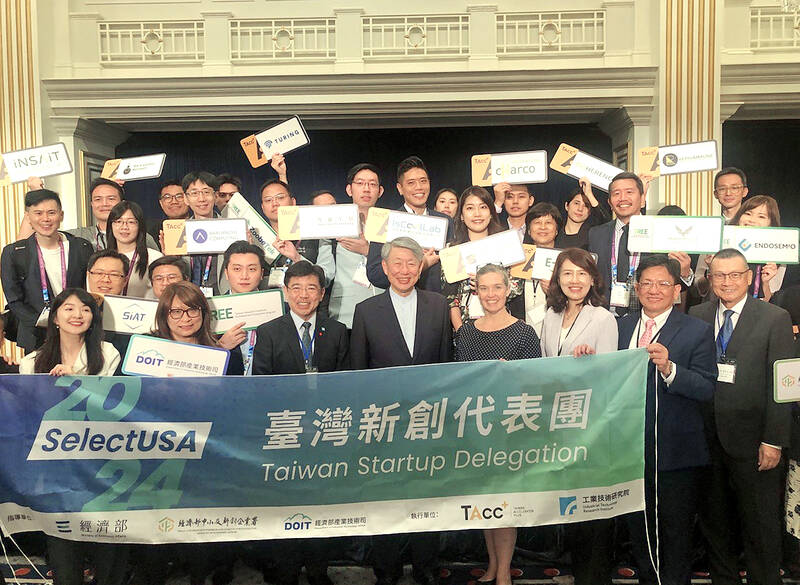President William Lai’s (賴清德) administration is considering a plan to import labor to deal with an impending shortage of engineers and other highly skilled workers, Minister of Economic Affairs J.W. Kuo (郭智輝) said in Washington on Tuesday.
Kuo was leading a delegation attending the SelectUSA Investment Summit.
Taiwan must attract about 400,000 to 500,000 skilled foreign workers for high-end manufacturing jobs by 2040, he said.

Photo: CNA
Ministry of Economic Affairs officials are still calculating the precise number of workers that are needed, as it works on loosening immigration restrictions and creating incentives, Kuo said.
Taiwanese firms operating factories in the US and other countries would help implement part of the plan by establishing education-to-employment pipelines stretching back to Taiwan, he said.
The firms would offer grants to attract high-achieving young people to study and work in Taiwan, he said.
After being professionally trained, they would return to their country of origin to work for the Taiwanese firm’s local branch, Kuo said.
Meanwhile, foreign-based companies building data centers in Taiwan would be required to employ a half-and-half workforce made up of foreign and local engineers to boost the nation’s indigenous research and development capabilities, he said.
These measures are necessary because population decline is expected to reduce the domestic supply of elite workers needed by the high-end manufacturing industries crucial to the nation’s economy, Kuo said.
Importing workers would not negatively affect Taiwan’s job market, as the foreign workers would be employed to deal with a labor shortage in Taiwan’s industries, he said.
The Ministry of the Interior is reviewing immigration and tax laws to see if changes can be made to facilitate recruitment for Taiwanese semiconductor, medical care and biopharmaceutical firms, Kuo said.
The nation’s technical leadership in these fields could help to recruit foreign talent, he added.
Kuo said he visited the US state, commerce and treasury departments to communicate the importance of eliminating double taxation with the US, he said.
The delegation emphasized that the issue is a stumbling block for Taiwanese small and medium-sized businesses planning to invest in the US, Kuo said.
US officials were urged to draft a bill to deal with that problem, he said, adding that the officials expressed optimism that the US Congress would swiftly pass related legislation awaiting review in the US Senate.

A car bomb killed a senior Russian general in southern Moscow yesterday morning, the latest high-profile army figure to be blown up in a blast that came just hours after Russian and Ukrainian delegates held separate talks in Miami on a plan to end the war. Kyiv has not commented on the incident, but Russian investigators said they were probing whether the blast was “linked” to “Ukrainian special forces.” The attack was similar to other assassinations of generals and pro-war figures that have either been claimed, or are widely believed to have been orchestrated, by Ukraine. Russian Lieutenant General Fanil Sarvarov, 56, head

A magnitude 7.0 earthquake struck off Yilan at 11:05pm yesterday, the Central Weather Administration (CWA) said. The epicenter was located at sea, about 32.3km east of Yilan County Hall, at a depth of 72.8km, CWA data showed There were no immediate reports of damage. The intensity of the quake, which gauges the actual effect of a seismic event, measured 4 in Yilan County area on Taiwan’s seven-tier intensity scale, the data showed. It measured 4 in other parts of eastern, northern and central Taiwan as well as Tainan, and 3 in Kaohsiung and Pingtung County, and 2 in Lienchiang and Penghu counties and 1

SAFETY FIRST: Double the number of police were deployed at the Taipei Marathon, while other cities released plans to bolster public event safety Authorities across Taiwan have stepped up security measures ahead of Christmas and New Year events, following a knife and smoke bomb attack in Taipei on Friday that left four people dead and 11 injured. In a bid to prevent potential copycat incidents, police deployments have been expanded for large gatherings, transport hubs, and other crowded public spaces, according to official statements from police and city authorities. Taipei Mayor Chiang Wan-an (蔣萬安) said the city has “comprehensively raised security readiness” in crowded areas, increased police deployments with armed officers, and intensified patrols during weekends and nighttime hours. For large-scale events, security checkpoints and explosives

‘POLITICAL GAME’: DPP lawmakers said the motion would not meet the legislative threshold needed, and accused the KMT and the TPP of trivializing the Constitution The Legislative Yuan yesterday approved a motion to initiate impeachment proceedings against President William Lai (賴清德), saying he had undermined Taiwan’s constitutional order and democracy. The motion was approved 61-50 by lawmakers from the main opposition Chinese Nationalist Party (KMT) and the smaller Taiwan People’s Party (TPP), who together hold a legislative majority. Under the motion, a roll call vote for impeachment would be held on May 19 next year, after various hearings are held and Lai is given the chance to defend himself. The move came after Lai on Monday last week did not promulgate an amendment passed by the legislature that